Friday, 13 February 2026

The OneRicePH Project has advanced 25 promising rice lines to the National Cooperative Tests (NCT)—a decisive step toward delivering climate-resilient, high-yielding, and consumer-preferred varieties to Filipino farmers.
The shortlisting, announced during the 3rd Advancement Meeting at SEARCA Headquarters, reflects a coordinated effort by the International Rice Research Institute (IRRI), the Department of Agriculture–Philippine Rice Research Institute (DA-PhilRice), and the University of the Philippines Los Baños (UPLB). Of the 25 entries, eight came from IRRI, three from DA-PhilRice, and 14 from UPLB.
Only rice lines that outperformed current check varieties in yield, disease resistance, and grain quality advanced to the NCT. These elite candidates carry resistance genes against blast, bacterial blight, sheath blight, and tungro virus, while also demonstrating grain traits aligned with Philippine market demand—good milling recovery, low chalkiness, long grain length, and suitable amylose content.
“We must do our best to strengthen national rice production and stability under climate change,” said Dr. Sankalp Bhosale, Interim Research Director of IRRI’s Rice Breeding Innovation. “The Philippines remains one of Asia’s most climate-vulnerable countries, and this project is already aligning genetics to market segments to support self-sufficiency and resilience.”
The initiative also includes establishing a Core Breeding Panel, maintained by DA-PhilRice, as a shared pool of elite materials to accelerate breeding pipelines across institutions. Looking ahead, IRRI’s Dr. Mary Jean Du urged partners to sustain momentum: “From 2026, regional partners will take direct ownership. With established protocols, you already know which traits to prioritize, and which varieties best suit your environment.”
The next phase includes regional workshops in Luzon, Visayas, and Mindanao to finalize 2026 regional work plans under Modules 2 (Modernizing Breeding Strategy) and 5 (Increasing Variety Turnover in Farmers’ Fields). These steps ensure alignment with the Philippine Rice Industry Roadmap and long-term sustainability goals.
Funded by the Department of Agriculture–Bureau of Agricultural Research (DA-BAR), OneRicePH represents a whole-of-system approach to accelerate variety turnover, modernize breeding strategies, and deliver resilient rice directly to farmers’ fields—critical to food security, farmer incomes, and consumer choice in the Philippines.